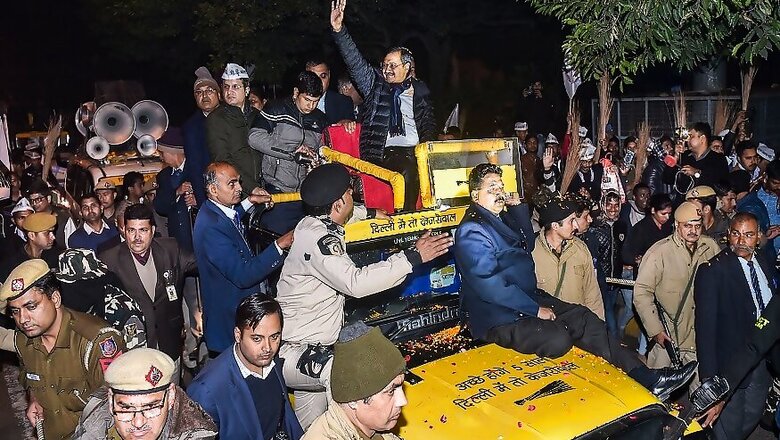
views
New Delhi: Marked by the BJP aggressively raising the anti-CAA protests in Shaheen Bagh as a poll issue, the AAP hard-selling development and the Congress conspicuous by its near absence, the bitter, often divisive and vitriolic campaign for the Delhi elections ended on Thursday.
In their final electioneering push, the three key parties made last ditch efforts to seek votes and slugged it out over issues ranging from the Citizenship (Amendment) Act, appeasement politics and unemployment.
The campaign that lasted for over three weeks ended at 6 pm on Thursday, just 38 hours before the start of voting for the high-stakes Delhi assembly election. There are 672 candidates in fray for 70 Assembly seats.
Over 1.47 crore total voters in various categories include males (81,05,236), females (66,80,277), service voters (11,608), third gender voters (869), and senior citizens (aged 80 and above) voters (2,04,830), according to Delhi CEO Office.
On the last day of the campaign, Home Minister Amit Shah took out three roadshow at Seelampur in northeast Delhi, and Hari Nagar and Madipur in west Delhi.
"During the elections (campaigning), got a chance to communicate with Delhi people. Delhi is suffering from anarchy and needs development. It is clear from the support for the BJP in Delhi that the party is going to form the government by winning more than 45 seats on February 11," Shah asserted.
BJP president J P Nadda also took out two roadshows in Nangloi Jat and Mangolpuri in northwest Delhi while Deputy Chief Minister Manish Sisodia did a 'padayatra' (walk) in his Patparganj constituency in east Delhi.
Speeches and tweets with communal undertones, and poll claims that violated the Model Code of Conduct kept the poll authorities on their toes all through the campaign.
The BJP, which started the campaign with a focus on the development work done by the Centre for the national capital, took a sharp turn and made Shaheen Bagh, the epicentre of anti-CAA protest in southeast Delhi, its main poll plank.
The saffron party's campaign saw Prime Minister Narendra Modi address two rallies while Shah addressed many more. Nadda and Uttar Pradesh Chief Minister Yogi Adityanath were also in full throttle over the Shaheen Bagh protest and attacked the Congress and the AAP.
The BJP till Wednesday had organised 5,239 campaigning events, said Praveen Shankar Kapoor, co-convenor of the Delhi BJP's media team for election said. This includes two rallies by Modi.
Shah covered 60 constituencies that comprised 'nukkad sabhas', road shows, workers meet, while Nadda criss-crossed across all 70 constituencies, Kapoor added.
Apart from its MPs and MLAs, the BJP also roped in chief ministers of party-ruled states -- Vijay Rupani (Gujarat), Adityanath (Uttar Pradesh), N Biren Singh (Manipur), M L Khattar (Haryana), Jairam Thakur (Himachal Pradesh) -- to canvass for its candidates.
The campaign got bitter when Union Minister Anurag Thakur, in a rally, egged the crowd to say 'shoot the traitors', and the party's West Delhi MP Parvesh Verma made a controversial statement on Shaheen Bagh.
Both Thakur and Verma were banned from campaigning for 72 and 96 hours respectively and also dropped from the party's star campaigner's list.
On Wednesday, Verma was again barred from campaigning while Adityanath was issued a show-cause notice on Thursday for his alleged 'biryani for terrorist' remarks.
BJP leader and its Model Town candidate Kapil Mishra was also banned from campaigning for 24 hours for his controversial tweets.
On the other hand, AAP focused its campaign on development work done by its government.
In an interview to PTI, Kejriwal assured that the Delhi government's 'free schemes' will continue if AAP is voted back to power and also introduce more schemes if needed.
The entire AAP campaign, which started before the polls were announced, was piloted by Kejriwal. He addressed nearly 200 events that included road shows, public meetings and town halls.
The AAP held silent marches against the BJP in all 70 constituencies for three days to protest against Verma's "terrorist" remarks.
The party also launched a door-to-door campaign, asking voters to support Kejriwal if they believed he is a "son of Delhi" and vote for the BJP if they feel he is a "terrorist".
The Congress' campaign did not match the vigour of its opponents.
However, as polling day drew closer, the party jumped into action with former prime minister Manmohan Singh addressing a rally in Rajouri Garden on Tuesday while Rahul Gandhi and his sister Priyanka Gandhi Vadra addressed public meetings on Tuesday and Wednesday.
The Congress also fielded its chief ministers -- Amarinder Singh (Punjab), Bhupesh Baghel (Chhattisgarh) for canvassing.
As the campaign ended, Congress' chief spokesperson Randeep Singh Surjewala claimed his party may spring a surprise in Delhi like it did in the elections in neighbouring Haryana last year.
BSP supremo Mayawati also campaigned on Monday for her party which has fielded 68 candidates in the Assembly polls.
This time, both the Congress and the BJP have given seats to their allies.
Canvassing votes for his party candidates in Sangam Vihar and Burari seats, Bihar Chief Minister Nitish Kumar targeted Kejriwal over his claims of development.
Lok Janshakti Party (LJP) has also fielded candidate from Seemapuri, and its leader Chirag Paswan campaigned for him as well as other NDA candidates.
While Rashtriya Janta Dal leader Tejashwi Yadav campaigned for its UPA ally as well for his party candidate from Palam, the Trinamool Congress is backing the AAP.














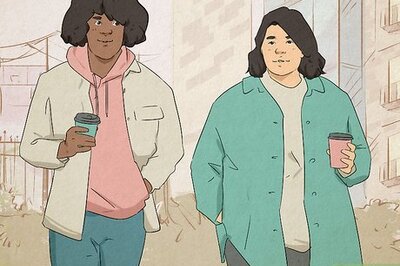
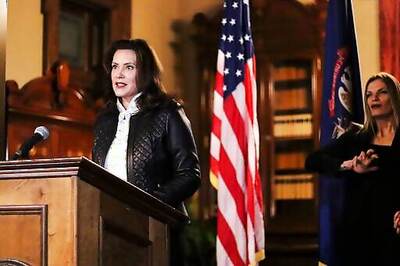
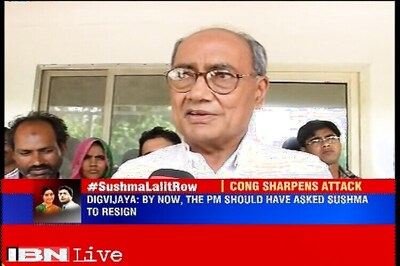
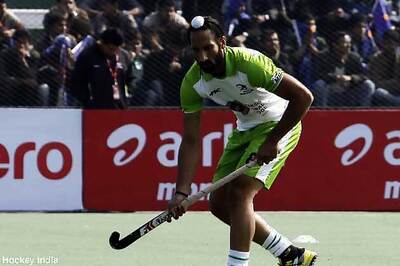

Comments
0 comment